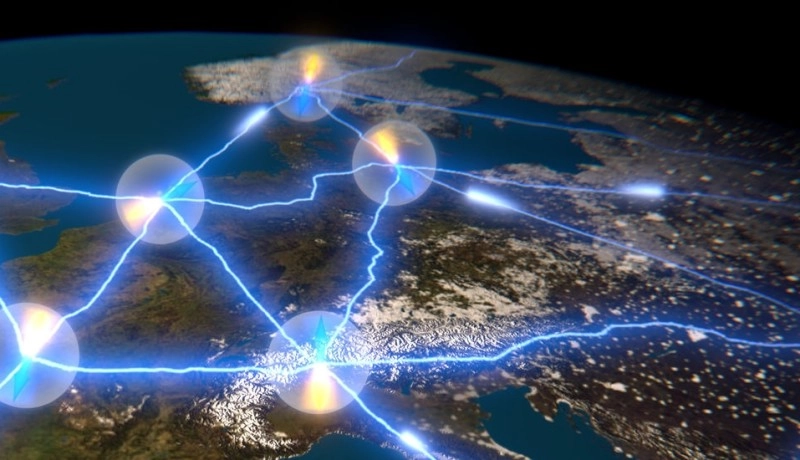The concept of the quantum internet represents a groundbreaking evolution in the way we think about communication and data exchange. Building on the principles of quantum mechanics, the quantum internet promises to revolutionize digital communication by offering unprecedented levels of security, efficiency, and functionality. This blog delves into the fundamental concepts behind the quantum internet, its potential applications, the technologies driving its development, and the challenges that lie ahead.
At its core, the quantum internet leverages the principles of quantum mechanics to create a new framework for communication. Unlike classical communication methods, which rely on sending bits of information through various channels, the quantum internet uses quantum bits, or qubits, to represent and transmit information. Qubits can exist in multiple states simultaneously due to a phenomenon known as superposition. This characteristic enables quantum systems to perform complex calculations and communicate information in ways that classical systems cannot achieve.
One of the most exciting features of the quantum internet is quantum entanglement. Entanglement is a phenomenon where two qubits become linked in such a way that the state of one qubit instantly influences the state of the other, regardless of the distance between them. This property allows for the creation of quantum communication channels that are fundamentally secure. Unlike classical methods, which can be intercepted and compromised, quantum communication ensures that any attempt to eavesdrop on the data would be immediately detected. This level of security is achieved through quantum key distribution (QKD), a technique that uses the principles of quantum mechanics to establish a shared, secret key between two parties. QKD is already being tested and implemented in various experimental setups and is expected to be a cornerstone of the quantum internet.
The potential applications of the quantum internet are vast and transformative. One of the most promising applications is in the realm of secure communication. Quantum internet’s inherent security features make it ideal for applications that require high levels of confidentiality, such as financial transactions, government communications, and personal data protection. For example, quantum networks could be used to protect sensitive data during transmission, ensuring that information is secure from potential threats and breaches.
Another significant application is in the field of quantum computing. Quantum computers have the potential to solve complex problems that are beyond the capabilities of classical computers. The quantum internet can enable quantum computers to communicate and share information with one another, creating a global network of quantum computational resources. This interconnection could lead to advancements in fields such as drug discovery, materials science, and cryptography. By enabling collaborative computing across different quantum systems, the quantum internet could accelerate scientific discoveries and technological innovations.
Quantum internet also has implications for advancing our understanding of quantum physics. By creating large-scale quantum networks, researchers can perform experiments and tests that were previously impossible. For instance, large-scale quantum entanglement experiments could provide new insights into the fundamental principles of quantum mechanics and explore phenomena such as quantum teleportation and quantum superposition on a global scale.
The development of the quantum internet relies on several key technologies and concepts. One of these is the creation of quantum repeaters, devices that extend the range of quantum communication by amplifying and retransmitting quantum signals. Quantum repeaters are essential for building long-distance quantum networks, as they overcome the limitations of signal degradation over large distances. Researchers are working on various techniques to develop practical and efficient quantum repeaters, including entanglement swapping and quantum memory.
Another crucial technology is the development of quantum networks and protocols. Quantum networks involve the design and implementation of infrastructure that supports quantum communication. This includes the development of quantum routers, switches, and network protocols that manage the transmission and processing of quantum information. Quantum networking protocols must address challenges such as error correction, network management, and the integration of quantum and classical communication systems.
The creation of practical quantum communication systems also involves advancements in quantum key distribution and quantum cryptography. QKD protocols must be optimized for efficiency, security, and scalability. Researchers are exploring various QKD schemes, including those based on different types of quantum states, to improve the performance of quantum communication systems.
Despite its potential, the quantum internet faces several challenges that must be addressed before it can become a reality. One major challenge is the development of scalable and reliable quantum hardware. Building and maintaining quantum communication systems requires advanced technologies and precise engineering, which are still in the early stages of development. Researchers must overcome technical hurdles related to qubit stability, error rates, and hardware integration to create functional quantum networks.
Another challenge is the need for international collaboration and standardization. The quantum internet will require cooperation between governments, research institutions, and private companies to develop standards, share knowledge, and establish global quantum communication networks. International efforts are underway to create frameworks for collaboration and to coordinate research and development efforts in the field of quantum communication.
The cost of implementing quantum internet technologies is also a significant challenge. Developing and deploying quantum communication infrastructure requires substantial investment in research, development, and construction. Funding and resource allocation will be crucial for advancing quantum internet technologies and bringing them to market.
The timeline for the widespread adoption of the quantum internet is still uncertain. While significant progress has been made in laboratory experiments and small-scale demonstrations, it will take time to overcome the technical, economic, and collaborative challenges necessary for a global quantum network. However, ongoing research and development efforts are laying the groundwork for the future of quantum communication.
The quantum internet represents a new era of communication, offering transformative possibilities for secure communication, quantum computing, and scientific research. By leveraging the principles of quantum mechanics, the quantum internet promises to create a framework for data transmission and computational collaboration that surpasses the capabilities of classical systems.
As we advance towards the realization of the quantum internet, ongoing research, technological innovation, and international cooperation will be essential for overcoming the challenges and unlocking the full potential of this revolutionary technology. The future of the quantum internet holds immense promise for enhancing security, expanding computational resources, and deepening our understanding of the quantum world.
The exploration of the quantum internet is not just about developing new technologies but also about shaping the future of communication and data exchange in a way that was once the realm of science fiction. The journey towards a quantum-enabled future is underway, and it will be exciting to see how these advancements unfold in the coming years.
By Our Media Team
Our Editorial team comprises of over 15 highly motivated bunch of individuals, who work tirelessly to get the most sought after curated content for our subscribers.




